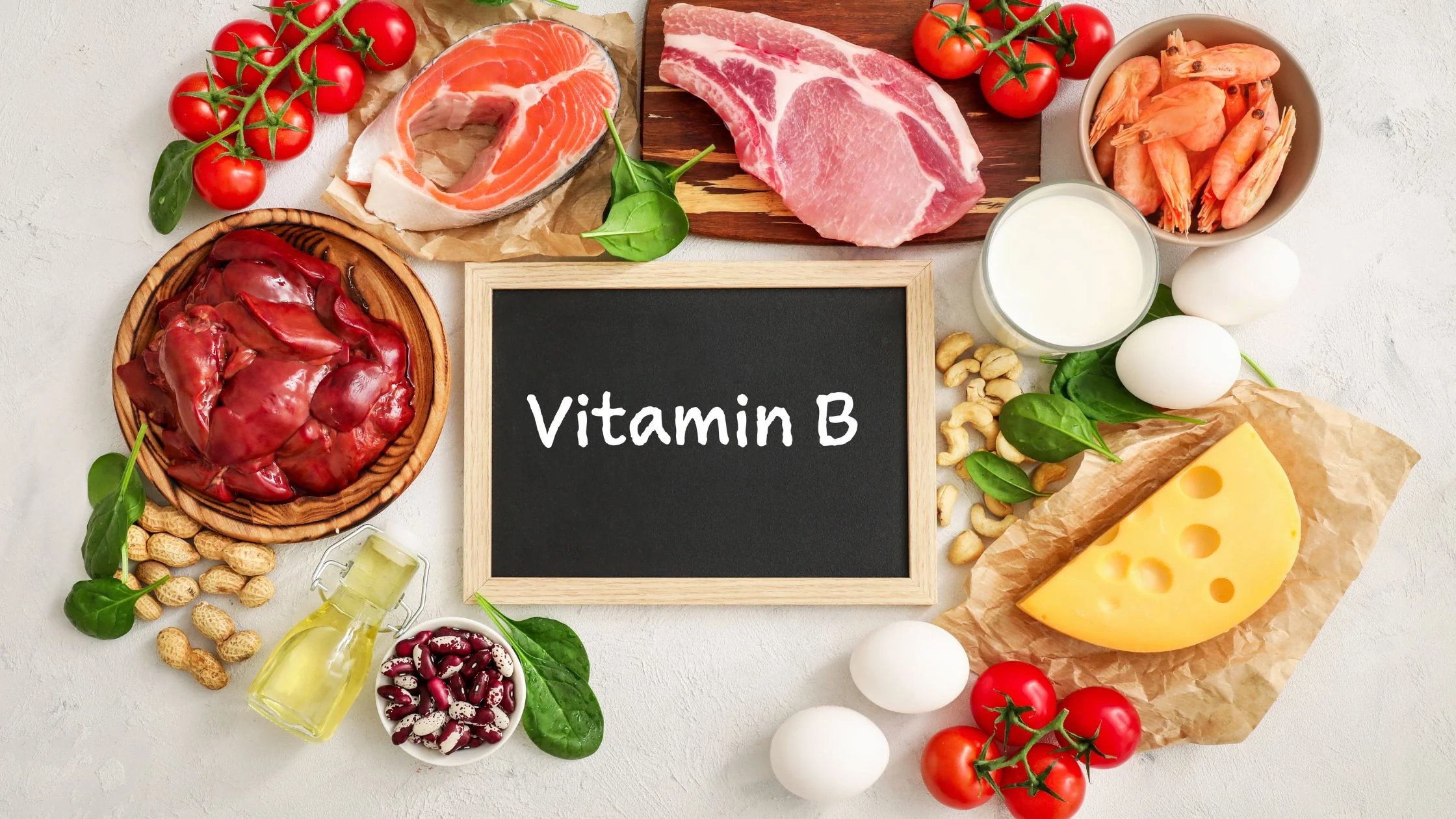B vitamins are essential nutrients that play a crucial role in various aspects of health, including energy levels, mental well-being, immune function, and the condition of skin and hair. This article explores how B vitamins can enhance your health and appearance by supporting your body’s systems effectively. By understanding their benefits and how to incorporate them into your diet, you can make informed choices to address common issues such as fatigue, mood swings, and skin or hair concerns.
In this article you will find:
Boosting Energy Levels with B Vitamins
In our fast-paced world, maintaining optimal energy levels is crucial for productivity, focus, and overall well-being. One often-overlooked secret to achieving this is the role of B vitamins in our diet. These essential nutrients play a significant role in energy metabolism, helping to convert the food we consume into usable energy. Understanding how B vitamins can boost your energy levels can empower you to make informed dietary choices that enhance your vitality.
The Role of B Vitamins in Energy Metabolism
B vitamins, which include B1 (thiamine), B2 (riboflavin), B3 (niacin), B5 (pantothenic acid), B6 (pyridoxine), B7 (biotin), B9 (folate), and B12 (cobalamin), are vital in numerous biochemical processes. Their primary function is to assist in converting carbohydrates, fats, and proteins into energy. Here’s how specific B vitamins contribute to energy production:
- Vitamin B1 (Thiamine): This vitamin helps break down sugars, ensuring a steady supply of energy for your body’s cells.
- Vitamin B2 (Riboflavin): Essential for the metabolism of fats and carbohydrates, riboflavin also plays a role in energy production at the cellular level.
- Vitamin B3 (Niacin): Niacin is crucial for the conversion of food into energy and is known for its role in enhancing blood circulation, which can help deliver oxygen and nutrients to muscles.
- Vitamin B5 (Pantothenic Acid): This vitamin is involved in the synthesis of coenzyme A, which is critical for fatty acid metabolism, thus fueling energy production.
- Vitamin B6 (Pyridoxine): B6 is vital for amino acid metabolism, enabling the body to utilize protein efficiently for energy.
- Vitamin B12 (Cobalamin): A key player in red blood cell formation, B12 ensures optimal oxygen transport, which is essential for sustaining energy levels during physical activity.
Signs of B Vitamin Deficiency
A deficiency in B vitamins can lead to feelings of fatigue and low energy. Common signs of deficiency may include:
- Persistent tiredness or weakness
- Difficulty concentrating or memory issues
- Unexplained irritability or mood swings
- Digestive problems
If you notice these symptoms, it may be time to assess your diet and consider incorporating more B vitamin-rich foods.
Sources of B Vitamins
Incorporating a variety of foods into your diet can help ensure you’re getting sufficient B vitamins. Here are some excellent sources:
- Whole grains: Brown rice, oats, and quinoa
- Meat and poultry: Chicken, turkey, and beef
- Dairy products: Milk, yogurt, and cheese
- Leafy greens: Spinach, kale, and broccoli
- Legumes: Lentils, beans, and peas
- Nuts and seeds: Almonds, sunflower seeds, and walnuts
For those following a vegetarian or vegan diet, it’s especially important to focus on fortified foods and consider supplements, particularly for B12, which is primarily found in animal products.
Tips for Maximizing Energy Levels with B Vitamins
To fully harness the energy-boosting potential of B vitamins, consider these actionable tips:
- Balanced meals: Aim for meals that combine proteins, healthy fats, and complex carbohydrates to optimize nutrient absorption.
- Stay hydrated: Proper hydration is crucial for metabolic processes, including energy production.
- Mindful eating: Pay attention to your body’s hunger cues and eat nutrient-dense foods to support sustained energy levels.
By understanding the importance of B vitamins and how they contribute to your energy levels, you can make dietary choices that support your active lifestyle. For more detailed insights on the connection between diet and energy, consider exploring resources like National Geographic.
Supporting Mental Health through B Vitamin Intake
In recent years, there has been a growing recognition of the profound link between nutrition and mental health. Among the essential nutrients, B vitamins have emerged as critical players in supporting mental well-being. This article explores how B vitamins can positively impact mental health, the mechanisms behind their effects, and practical ways to incorporate them into your diet.
The Connection Between B Vitamins and Mental Health
B vitamins, particularly B6, B9 (folate), and B12, are known for their roles in brain function and mental health. These vitamins are involved in the synthesis of neurotransmitters, which are chemicals that facilitate communication between nerve cells. Here’s how they contribute:
- Vitamin B6: This vitamin is essential for the production of neurotransmitters such as serotonin and dopamine, which regulate mood and emotional responses. Low levels of B6 have been linked to increased feelings of anxiety and depression.
- Folate (Vitamin B9): Folate is crucial for DNA synthesis and repair, but it also plays a significant role in the production of mood-regulating neurotransmitters. Studies have shown that individuals with low folate levels are at a higher risk of developing depressive symptoms.
- Vitamin B12: B12 is vital for maintaining the health of nerve cells and is involved in the synthesis of neurotransmitters. A deficiency in B12 can lead to cognitive decline and mood disorders.
Research Supporting B Vitamins and Mental Health
Numerous studies have highlighted the impact of B vitamins on mental health. For instance, research published in the journal Nutrients indicates that supplementation with B vitamins can significantly improve mood and reduce symptoms of anxiety and depression in individuals with deficiencies. Another study found that a combination of B vitamins improved cognitive function and emotional well-being in older adults.
Moreover, a comprehensive review in The Journal of Nutrition noted that higher intakes of B vitamins, particularly folate, were associated with a lower risk of depression and cognitive decline. This evidence suggests that maintaining adequate levels of B vitamins is crucial for mental health, particularly in vulnerable populations.
Signs of B Vitamin Deficiency and Mental Health Implications
A deficiency in B vitamins can manifest in various ways, often affecting both physical and mental health. Some common signs include:
- Fatigue and low energy
- Mood swings and irritability
- Difficulty concentrating or memory problems
- Increased anxiety or depressive symptoms
If you experience these symptoms, it may be beneficial to evaluate your dietary intake and consider increasing your consumption of B vitamin-rich foods.
Incorporating B Vitamins into Your Diet
To support mental health through B vitamin intake, consider including a variety of nutrient-dense foods in your daily diet. Here are some excellent sources:
- Meats and fish: Chicken, turkey, beef, and fatty fish such as salmon are rich in B vitamins.
- Leafy greens: Spinach, kale, and collard greens are excellent sources of folate.
- Legumes: Lentils, chickpeas, and black beans provide a good amount of B vitamins.
- Nuts and seeds: Almonds and sunflower seeds are great snacks that also boost B vitamin levels.
- Whole grains: Foods like brown rice, oats, and whole wheat bread are beneficial for overall B vitamin intake.
For those who follow a vegetarian or vegan diet, it’s crucial to seek fortified foods or consider supplements, especially for B12, which is primarily found in animal products.
Conclusion
Incorporating B vitamins into your diet is not only vital for physical health but is equally important for maintaining mental well-being. As research continues to unveil the connections between nutrition and mental health, it’s clear that prioritizing B vitamin intake can be a powerful strategy for enhancing emotional resilience and cognitive function. For more insights into the relationship between diet and mental health, check out resources like National Geographic.
Enhancing Immune Function with B Vitamins
In an era where health and wellness are at the forefront of our priorities, understanding how to support our immune system is crucial. One of the most effective ways to enhance immune function is through the intake of B vitamins. These essential nutrients play a pivotal role in maintaining a robust immune system, helping our bodies fend off infections and diseases. This article delves into how B vitamins support immune health, the mechanisms behind their benefits, and practical tips for incorporating them into your diet.
The Role of B Vitamins in Immune Function
B vitamins, particularly B6, B9 (folate), and B12, are integral to various biochemical processes that bolster the immune system. Here’s a closer look at how these vitamins contribute:
- Vitamin B6: This vitamin is essential for the production and activation of immune cells, including lymphocytes and antibodies. Adequate B6 levels enhance the body’s ability to respond to infections and inflammation.
- Folate (Vitamin B9): Folate is crucial for DNA synthesis and repair, playing a vital role in the production of new cells, including immune cells. Low levels of folate can impair immune function and increase susceptibility to infections.
- Vitamin B12: B12 is essential for maintaining the health of red blood cells and supporting the overall function of the immune system. A deficiency in B12 can lead to anemia and weakened immune responses.
Research on B Vitamins and Immune Health
Numerous studies underscore the importance of B vitamins in enhancing immune function. Research published in the Journal of Nutritional Biochemistry indicates that B6 deficiency can lead to impaired immune responses, while adequate intake is associated with improved resistance to infections. Furthermore, a study in Clinical and Experimental Immunology found that folate supplementation improved the immune response in older adults, highlighting the vitamin’s significance in aging populations.
Moreover, a comprehensive review in Frontiers in Nutrition concluded that adequate B vitamin intake is linked to a lower risk of infection and improved immune system performance, suggesting that these vitamins are crucial for maintaining health, especially during cold and flu seasons.
Signs of B Vitamin Deficiency and Immune Implications
A deficiency in B vitamins can lead to various health issues, significantly impacting immune function. Common signs of deficiency may include:
- Frequent infections or illnesses
- Fatigue and weakness
- Skin rashes or changes
- Mood disturbances, such as increased anxiety or depression
If you experience these symptoms, it may be time to assess your B vitamin intake and consider dietary adjustments.
Sources of B Vitamins for Immune Support
Incorporating a variety of foods into your diet can help you maintain optimal levels of B vitamins. Here are some excellent sources:
- Meats and fish: Chicken, turkey, beef, and fish like salmon and tuna are rich in B vitamins.
- Legumes: Lentils, chickpeas, and black beans provide a good source of B vitamins, particularly folate.
- Leafy greens: Spinach, kale, and broccoli are excellent sources of folate and other B vitamins.
- Whole grains: Foods like brown rice, quinoa, and oats are beneficial for overall B vitamin intake.
- Nuts and seeds: Almonds, sunflower seeds, and walnuts can be great snacks that boost B vitamin levels.
For individuals following vegetarian or vegan diets, it’s essential to seek fortified foods or consider B12 supplements, as this vitamin is primarily found in animal products.
Practical Tips for Enhancing Immune Function with B Vitamins
To maximize the immune-boosting benefits of B vitamins, consider the following actionable tips:
- Eat a balanced diet: Aim for a variety of whole foods rich in B vitamins to support overall health.
- Consider supplementation: If you’re at risk for deficiencies, particularly B12, consult a healthcare provider about supplementation options.
- Stay hydrated: Proper hydration is essential for optimal immune function and nutrient absorption.
By prioritizing B vitamin intake, you can enhance your immune function and support your body’s ability to ward off illnesses. For further insights on the importance of nutrition for immune health, visit reputable sources like NCBI.
Promoting Healthy Skin and Hair with B Vitamins
In the quest for vibrant skin and luscious hair, many people often overlook the role of B vitamins. These essential nutrients are not only crucial for overall health but also play a significant role in maintaining the health and appearance of our skin and hair. This article explores how B vitamins contribute to beauty from within, the mechanisms behind their effects, and practical ways to ensure adequate intake.
The Impact of B Vitamins on Skin Health
B vitamins are known for their ability to support various bodily functions, including cell growth and repair, which are vital for healthy skin. Here’s how specific B vitamins contribute to skin health:
- Vitamin B2 (Riboflavin): This vitamin helps in the maintenance of healthy skin by promoting proper cell growth and repair. A deficiency in riboflavin can lead to skin disorders such as dermatitis.
- Vitamin B3 (Niacin): Niacin is renowned for its ability to improve skin barrier function, enhance hydration, and reduce redness and inflammation. Topical niacinamide is often included in skincare products for these benefits.
- Vitamin B5 (Pantothenic Acid): This vitamin is known for its moisturizing properties, helping to keep skin hydrated and soft. It also aids in wound healing and can reduce the appearance of scars.
- Folate (Vitamin B9): Folate is essential for DNA synthesis and repair, which is crucial for skin cell regeneration. Adequate levels of folate can help in maintaining a youthful complexion.
The Role of B Vitamins in Hair Health
Healthy hair relies on a variety of nutrients, and B vitamins play a significant role in promoting hair growth and strength. Here’s how they contribute:
- Vitamin B7 (Biotin): Often touted as the “hair vitamin,” biotin supports keratin production, a protein that makes up the structure of hair. Biotin deficiency can lead to hair thinning and brittleness.
- Vitamin B12: This vitamin is crucial for red blood cell formation, which helps deliver oxygen and nutrients to hair follicles, promoting healthy hair growth. A deficiency can lead to hair loss.
- Vitamin B6: B6 helps in the metabolism of amino acids, which are the building blocks of proteins, including those needed for hair health. It also aids in the production of melanin, the pigment responsible for hair color.
Research Supporting B Vitamins for Skin and Hair
Research has consistently shown the benefits of B vitamins for skin and hair health. A study published in the Journal of Cosmetic Dermatology found that oral supplementation with B vitamins significantly improved skin hydration, elasticity, and overall appearance. Another study indicated that biotin supplementation could reduce hair loss and improve hair thickness in individuals with thinning hair.
Furthermore, a review in Dermatology and Therapy highlighted the positive effects of niacinamide on skin conditions like acne and rosacea, demonstrating its ability to improve skin barrier function and reduce inflammation.
Signs of B Vitamin Deficiency Affecting Skin and Hair
Deficiencies in B vitamins can lead to noticeable changes in skin and hair health. Some signs may include:
- Dry, flaky skin or dermatitis
- Hair thinning or hair loss
- Rough, uneven skin texture
- Increased pigmentation or redness
If you experience these symptoms, it may be time to reassess your diet and consider increasing your intake of B vitamins.
Sources of B Vitamins for Healthy Skin and Hair
To support skin and hair health, it’s important to include a variety of B vitamin-rich foods in your diet. Here are some excellent sources:
- Eggs: A rich source of biotin and other B vitamins.
- Leafy greens: Spinach, kale, and other greens provide folate and riboflavin.
- Whole grains: Foods like brown rice, quinoa, and oats are beneficial for overall B vitamin intake.
- Nuts and seeds: Almonds, sunflower seeds, and walnuts are great snacks that boost B vitamin levels.
- Meats and fish: Chicken, turkey, and fish like salmon are rich in several B vitamins, including B12.
For those following a vegetarian or vegan diet, it’s essential to seek fortified foods or consider supplements, particularly for B12, which is primarily found in animal products.
Practical Tips for Promoting Healthy Skin and Hair with B Vitamins
To maximize the benefits of B vitamins for skin and hair, consider these actionable tips:
- Maintain a balanced diet: Incorporate a variety of whole foods rich in B vitamins for optimal skin and hair health.
- Stay hydrated: Proper hydration is crucial for maintaining skin elasticity and hair moisture.
- Limit stress: Chronic stress can deplete B vitamin levels and negatively affect skin and hair health, so practice stress management techniques.
By prioritizing B vitamin intake, you can promote healthy skin and hair from the inside out. For more insights on the role of nutrition in beauty, explore resources like Healthline. B vitamins are essential nutrients that play a critical role in maintaining overall health, particularly for energy levels, mental well-being, immune function, and the health of skin and hair. Key B vitamins such as B6, B9 (folate), and B12 contribute to neurotransmitter production, support immune cell activation, and promote healthy skin and hair growth. Deficiencies in these vitamins can lead to symptoms such as fatigue, mood swings, frequent infections, and noticeable changes in skin and hair health.
To ensure adequate B vitamin intake, incorporate a variety of nutrient-rich foods into your diet, including meats, fish, leafy greens, whole grains, nuts, and seeds. For those following vegetarian or vegan diets, consider fortified foods or supplements, particularly for B12. Maintaining a balanced diet, staying hydrated, and managing stress are also important strategies for optimizing the benefits of B vitamins on overall health and beauty.




